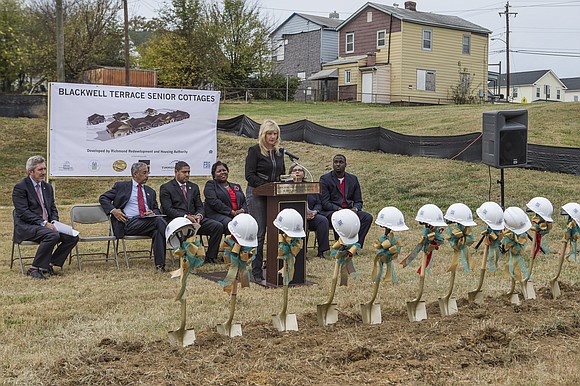Blackwell development to continue with 96 available lots
Jeremy M. Lazarus | 11/15/2018, 6 a.m.
It has taken 21 years, but the Hope VI redevelopment of Blackwell appears to be moving toward completion.
The Richmond Redevelopment and Housing Authority is seeking private entities and nonprofits to build 96 new houses in the South Side community on lots largely left vacant after 440 public housing apartments were removed 15 to 20 years ago.
Final bids are due on Thursday, Nov. 15, with a decision on contract awards to come after RRHA reviews the development proposals.
The new effort comes after Blackwell, named for a renowned African-American educator, was placed on the state and national registers of historic places.
According to the RRHA bid document posted Oct. 26, 50 of the new homes are to be built for families or individuals whose annual incomes are no more than 80 percent of the median income for the Richmond region, or a top income of $46,600 for a single person and $66,500 for a family of four.
The median annual income across the Richmond area for an individual is $58,250 and $83,125 for a family of four.
RRHA stated that it could reduce the price of each lot designated for affordable housing to a negligible amount if that would hold down the final price of the finished home.
Forty-six other lots are for homes to be built at market rates. Bidders would need to pay the appraised price, RRHA stated.
The lots are located in two sections of Blackwell, both of which would include lots for affordable and market rate housing.
The first section is bounded by Dinwiddie Avenue and Stockton, 15th and 19th streets, south of Hull Street. The second group of lots is located between Everett, Decatur, 9th and 11 streets, also south of Hull Street.
Councilwoman Ellen F. Robertson, 6th District, who chairs the Land Use, Housing and Transportation Committee and has pushed to boost production of affordable housing, praised RRHA for setting aside more than half of the lots for lower-cost housing. She called the effort “good news” to provide more housing that working families can afford.
Ms. Robertson also said that she is in talks with the city about raising the number of affordable homes to be developed in Blackwell. She estimates that another 35 to 45 properties are tax delinquent and could be picked by the city and sold with a stipulation that the finished product be developed in a price range considered affordable.
She said she is pushing for more affordable housing in Blackwell after hearing from residents about the surge in property values and their concerns that gentrification would price them out. Outside investors have been buying and renovating many of the properties and setting rents at $1,500 a month, well above previous rental values. Some elderly homeowners in the neighborhood, she said, are struggling to pay their real estate taxes as the value of their homes jump.
The HOPE VI redevelopment project began in 1997 when RRHA was awarded a $26.94 million grant from the U.S. Department of Housing and Urban Development to redo the decaying and crime-ridden public housing in Blackwell.
Since demolishing the old units and relocated the remaining families, RRHA has reported partnering to build 367 new units in Blackwell, including 161 apartments, 188 single-family homes and 18 cottage rentals for seniors.
In addition, RRHA has developed 120 single-family homes outside Blackwell, mostly farther west in Swansboro and in Fulton in the East End.
The removal of public housing also brought in private investment dollars that has led to renovation and new construction of apartments and single-family homes in Blackwell and along Hull Street.
Several years ago, RRHA officials said it had wrapped up the HOPE VI redevelopment program in that neighborhood after awarding the contract for senior cottages.
But the new bid document shows that is not the case. Of the 96 lots to be sold, 56 lie within the HOPE VI project area, RRHA stated, while the remaining 40 were part of the city’s Neighborhoods in Bloom program that operated separately but in concert with the HOPE VI project.
Given the hot housing market of the past three years, it is unclear why RRHA hung onto the vacant property until now. But with Blackwell gaining more attention from private interests, it appears RRHA could no longer avoid moving the property.







